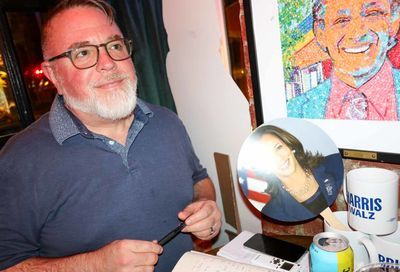Divine Diva: The Gays Who Shaped Aretha’s Gospel Soul
Aretha Franklin's gospel roots were partly shaped by the gays and lesbians in her life

In the days since Aretha Franklin, the Queen of Soul, passed — or, as the “saints” say was “called home” — there have been numerous obituaries crediting the power of her music to her gospel foundation. The New York Times wrote that she “brought the righteous fervor of gospel music to secular songs. And The Washington Post asserted that Aretha explored “the sweet spot between sultry rhythm and blues and the explosive gospel she’d grown up singing in her pastor father’s Baptist church.”
There has also been a lot attention given to her role as a lesbian and gay ally. She organized a concert to raise money for the Gay Men’s Health Crisis in 1993. And, more recently, in 2011, she played wedding singer at the marriage ceremony of a male couple. But what few, if any, have done in praising this preternaturally talented musician and longtime LGBTQ advocate is explore how the two are linked, to show how fundamental lesbians and gay men are to shaping the gospel aesthetic that is the basis of Franklin’s soul.
Music historian Anthony Heilbut writes: “During what I’ve defined as gospel’s golden age (1945-1960), most of the male gospel stars were gay.” The one who had the most impact on Aretha’s sound was Rev. James Cleveland. A prodigy of sorts, Cleveland became a boy soprano in the Pilgrim Baptist Church choir directed by “Father of Gospel” Thomas A. Dorsey. Once Cleveland’s voice went from clear and high to gravelly and low, he moved to L.A. and developed a style where he would almost narrate a song while a choir sang behind him. Cleveland became particularly successful when he joined forces with teenage keyboardist Billy Preston, who would score solo hits and play with the Rolling Stones in the ’70s. Together with the Angelic Choir, they recorded the faith-in-troubled-times anthem “Peace Be Still,” which sold nearly a million copies.
For Aretha, Cleveland was, as she expressed in a statement upon his death in 1991, “my earliest musical influence and musical mentor.” A twenty-something Cleveland, after being hired as Minister of Music at her Rev. C.L. Franklin’s church, moved in with the Franklin family. Aretha, who was in her teens, would sit with Cleveland side-by-side at the piano working on choral arrangements. In 1972, when Aretha decided to do a live gospel recording, she chose Cleveland to oversee the proceedings. The resulting album, Amazing Grace, became one of the most celebrated and best selling gospel albums of all time.
In addition to Cleveland, there were two women — who sometimes engaged in same-sex relationships — who were just as crucial to Aretha’s development. Gospel singer Clara Ward, known for her shiny metallic gowns and elephantine bouffants, “found safety in several sexual relationships with woman,” according to her sister Willa. But she was also the girlfriend of Aretha’s father. With her sharp, dynamic singing and bouncy piano playing, Clara became a musical advisor to Aretha. She also stepped in as a maternal figure since Aretha lost her own mother when she was a child.

Ward had a shaping effect on the young woman’s manners and style. She taught Aretha to eat a chicken leg by taking petite bites. And her eye-catching idiosyncratic fashions were a lifelong influence on Aretha. Even the way Aretha famously dropped her minks on stage was modeled after Clara doing the same at the funeral of Aretha’s aunt.
But no doubt the closest queer person to Aretha was her younger sister Carolyn, who preferred the company of women. Carolyn, also a singer and a songwriter, penned two of Aretha’s biggest hits, “Ain’t No Way” and “Angel,” both of which can be seen as reflecting a queer sensibility. The former deals with the pain of giving love that is unaccepted, and the latter addresses a particular kind of loneliness that can occur once you face — and possibly announce — a truth about yourself. As Aretha sings: “So much that I know/That I need somebody so.”
In the wake of Aretha’s passing, it is central that we praise the way she gave voice to the gospel impulse, the bringing together of people under a common purpose. She bore witness to our tremendous struggles — as individuals, romantic partners, family members, and citizens — and provided hope that if everything doesn’t immediately turn out right, at least it can get better. But amidst the lionization of this musical icon, it is also important that we don’t lose track of the specifics of her story, the gay men and women who shepherded Aretha on her journey, who were responsible for, to riff on a gospel tune, how she got over.
Longtime music critic Craig Seymour is the author of the biography Luther: The Life and Longing of Luther Vandross, the memoir All I Could Bare: My Life in the Strip Clubs of Gay Washington, D.C., and the novel Who’s Your Daddy. His archived music writing can be found at RandBeing.com. Follow him on Twitter at @craigspoplife.
Support Metro Weekly’s Journalism
These are challenging times for news organizations. And yet it’s crucial we stay active and provide vital resources and information to both our local readers and the world. So won’t you please take a moment and consider supporting Metro Weekly with a membership? For as little as $5 a month, you can help ensure Metro Weekly magazine and MetroWeekly.com remain free, viable resources as we provide the best, most diverse, culturally-resonant LGBTQ coverage in both the D.C. region and around the world. Memberships come with exclusive perks and discounts, your own personal digital delivery of each week’s magazine (and an archive), access to our Member's Lounge when it launches this fall, and exclusive members-only items like Metro Weekly Membership Mugs and Tote Bags! Check out all our membership levels here and please join us today!























You must be logged in to post a comment.